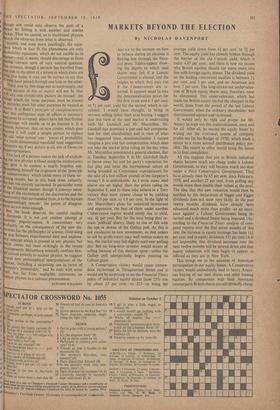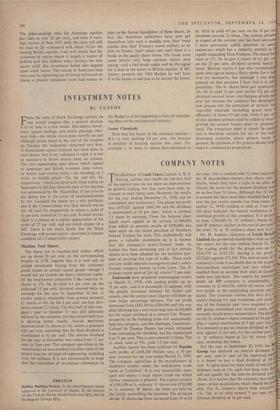MARKETS BEYOND THE ELECTION
By NICHOLAS DAVENPORT ADVICE to the investor on how to behave during an election is flowing fast through the finan- cial press. Tables appear show- ing the depths to which steel shares may fall if a Labour Government is elected, and the heights to which they may rise if the Conservatives are re- turned. It appears usual to take the denationalisation prices for the first event and a 5 per cent. to 51 per cent. yield for the second, which is cal- culated, 1 would have thought, to bring in nervous selling rather than avid buying. I suggest that this view of the steel market is underrating both Mr. Gaitskell and Mr. Macmillan. Mr. Gaiskell has promised a just and fair compensa- tion for steel shareholders and in view of what has happened since denationalisation I cannot imagine a just and fair compensation which does not take the market price ruling on the day when Mr. Macmillan announced a general election, that is, Tuesday, September 8. Is Mr. Gaitskell likely to throw away his and his party's reputation for fair play and incur the international odium of being branded as Communist expropriators for the sake of a few million pounds of the taxpayer's money? It is unthinkable. As 1 write many steel shares are no higher than the prices ruling on September 8, and to those who believe in a Tory victory they must appear cheap to be yielding from 5.9 per cent. to 6.8 per cent. In the light of Mr. Macmillan's plans for industrial investment and expansion, the best of them under another Conservative regime would surely rise to yield, say, 4+ per cent. But for the time being they re- main 'political' shares, likely to rise or fall with the ups or downs of the Gallup poll. As this is not conducive to new investment, so that orders to sell by profit-takers may well outrun orders to buy, the market may fall slightly until near polling day. But no long-term investor would dream of selling because of this election spree—unless the Gallup poll unexpectedly begins pointing to Labour gains.
A Conservative victory would cause tremen- dous excitement in Throgmorton Street and it would not be surprising to see the Financial Times index of industrial equity shares (now 255) rise by about 27 per cent.—to 323—to bring the
average yield down from 4+ per cent. to 3f per cent. The equity yield has already broken through the barrier of the old Consols yield, which is today 4.85 per cent., and there is now no reason why British equities should not move more into line with foreign equity shares. The dividend yield on the leading continental equities is between 2 per cent. and 3 per cent. and on American just over 3 per cent. The long-drawn-out undervalua- tion of British equity shares may, therefore, soon be eliminated. This undervaluation, which has made the British equity market the cheapest in the world, dates from the period of the last Labour Government when the ordinary shareholder was discriminated against and victimised.
It would only be right and proper for Mr. Amory to wipe out this undervaluation, once and for all. After all, he started the equity boom by wiping out the irrational system of company profits tax (in his Budget of 1958), which made a return to a more normal distribution policy pos- sible. His return to office would bring the boom to its final completion.
All this suggests that just as British industrial shares became much too cheap under a Labour Government, so they will become much too dear under a third Conservative Government. They have already risen by 65 per cent. since February, 1958, and another 27 per cent. from polling day would more than double their values at the start. The idea that this new valuation would then be justified by the declaration of bigger and bigger dividends does not seem very likely. In the past twelve months dividends have already been advanced much more than profits—as an insur- ance against a Labour Government being re- turned and a dividend freeze being imposed. (Ac- cording to the Financial Times analysis of com- pany reports over the first seven months of this year the increase in equity earnings has been 11.1. per cent. and in equity dividends 33-1 per cent.) It is not impossible that dividend increases over the next twelve months will be slowed down and that equity valuations will then begin to appear as inflated as they are in New York.
This brings me to the question of American participation in our equity boom. A Conservative victory would undoubtedly lead to heavy Ameri- can buying of our steel shares and other leading equities. By comparison with their American counterparts British shares are still absurdly cheap. The price-earnings ratio for American equities has risen to over 20 per cent., and even if earn- ings recover to their 1957 peak the ratio will still be close to 20-compared with about 10 for the leading British equities. I am well aware that the valuation of equity shares is largely a matter of fashion and that fashion today favours the slim equity yield. But investment habits also depend upon credit habits. The raising of American loan rates and the tightening-up of money advanced on shares at present valuations must lead sooner or later to the forced liquidation of these shares. In fact, the American authorities have now got themselves into such a muddle over their bond market that their Treasury seems unlikely to be able to finance itself unless and until there is a break in the equity share boom. The break must come before very long-perhaps before next spring-and a bad break might well be the signal for a stop in the boom in British equities. If Mr. Amory presents the 1960 Budget he will have it in his hands to end just as he started the boom.











































 Previous page
Previous page